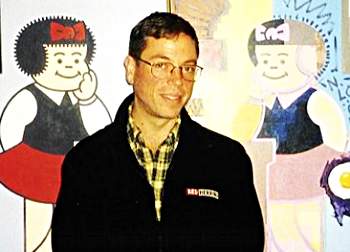
Contributors:
 Introduction by
Introduction by
Rachel Loden
 George Bowering
George Bowering
 Maxine Chernoff
Maxine Chernoff
 Gabriel Gudding
Gabriel Gudding
 Rachel Loden
Rachel Loden
 Ange Mlinko
Ange Mlinko
 K. Silem Mohammad
K. Silem Mohammad
 D. A. Powell
D. A. Powell
 Ron Silliman
Ron Silliman
 Gary Sullivan
Gary Sullivan
You can read an 80-page discussion by these contributors in this issue of Jacket.
This piece is about 24 printed pages long.
It is copyright © the contributors and Jacket magazine 2007.
When I invited members of the humor in poetry list (HumPo) to send poems to
complement our discussion in Jacket, I explicitly said that they need
not be funny. This may seem odd. But by this time we had developed a model of
comic poetry that was vastly more capacious than what is generally (and often
dismissively) described as “light verse.”
In response to
my posting Celan’s “Todesfugue” as an unfunny poem that had
enormous, complex resonance, Gabriel Gudding had said [in a conversation not
included in the Jacket excerpt] that the poem was triumphantly comic:
“This poem is probably one of the greatest Menippean satires ever shoved
into the lyric. I do not see Desnos or Prevert or Lorca or Vallejo — or
any of these voices — as tragic. Just as Whitman does (embracing the comic
without the haha), they are compelling us to move further — into and
beyond death. That is principally a comic move.”
My response
to him was that the poem was “Triumphant, yes, but comic? I don’t
know. I wonder whether the word comic becomes a meaningless stretched-out
grab-bag if we try to stuff ‘Todesfugue’ into it.”
But Gabe had a point. The comic poet isn’t aiming at creating
a series of literary laff riots, although she may get laughs. To truly inhabit a
comic sensibility is to live with more openness to the vexed and paradoxical way
things really are. If laughter happens, so much the better, but the comic
sensibility is more like a way of knowledge — one that avoids the
blinkered state of “seriousness,” if by seriousness we mean adopting
one (often grim) point of view and sticking to it. The comic poet looks instead
for contradiction, conundrum, even bafflement, and uses that bafflement, that
lack of certainty, to keep what Blake called “the doors of
perception” open to the infinite.
Rachel Loden is the author of Hotel Imperium and four chapbooks, including The Richard Nixon Snow Globe. Her work has appeared recently in New American Writing, Zoland Poetry, Best American Poetry 2005 and Saints of Hysteria: A Half-Century of Collaborative American Poetry, and she has been interviewed in The Iowa Review and Jacket. Awards include a Pushcart Prize, a Fellowship in Poetry from the California Arts Council, and a grant from the Fund for Poetry. She hopes to begin blogging relatively soon at http://wordstrumpet.blogspot.com/ |
The star-spangled banner fills a lot of catalogues,
covers a lot of contingencies, whose broad
stripes and bright stars Jack Kerouac refused to sit
upon, the red white and blue a bangle for your
wrist, a strangle for your necktie. But here is one
I was really hoping for, a classic USAmerican gee-
string, available in models for the female or male
gee. The one I’m looking at in full colour reproduction
shows a comely white male from just below his
belly button to just above his knees, a bright rect-
angle, and just in the middle the briefest of patriotic
undies, red and white stripes on one side, white stars
on a blue sky to the other; it’s enough to make you
stand at attention, open your heart, and sing, string, sing.
It’s a hot summer’s day somewhere; everyone is
wearing shorts. There’s a kid in that uniform, tee
shirt, yellow shorts, white socks, sneakers. There’s a guy
beside him, fat legs between white socks and shorts.
Behind them there’s a USAmerican flag, a woman
taking a picture, another woman with her hands on her
hips. She’s wearing tee shirt and shorts. She’s overweight.
In the middle, up front, is the center of this picture,
a guy in shorts and a St. Louis Cardinals tee shirt.
He’s wearing the stars and stripes around his head, long
hair hanging down in thin twists. He’s got narrow sun-
glasses and a thin mustache. He is carrying two hand-lettered
signs. The one held low says GO USA. In his other hand
he holds up a sign that says Get A BRAIN! MORANS.
All the blue jackets climb the hill of Trimble Street
grey pants of some sort under them, making me wonder how
my childhood stacked up against western literature, how
comfortable the chairs were in our house compared with what you could
expect along the Atlantic coast, but you could not expect ever to get there
unless you grew up and into a government job.
Fat people don’t mind your seeing them in black swimsuits
alongside the pool, or whether there are any dogs about
as long as they are small and ornamental. The paperbacks
they leave on their deckchairs are thick but worthless
at least in my estimation, about which I long ago got used to
indifference from all the adults in the house.
Nothing brings out envy like a good hat, the red and white
checked one that coach James was wearing at the gym last week
where the team we favour lost rather badly and was the main
topic of conversation among the parents. A long way down
a rutted farm road in Saskatchewan it is nigh impossible
to discern what colour pickup Mister Farmer is backing.
Early afternoon when I sit on my bed to begin dressing
I wonder for a second what colour my underwear will be this day
and then I open the drawer. The radio might be on and if it is
it might be filling the bedroom with Schumann’s Third.
This part of life is just as good as some, and the food
is certainly better, and now I am, I remember, wearing green.

|
George Bowering was a member of the so-called Tish group of the sixties, young Vancouver poets who treated Don Allen’s anthology as a sacred text. He became a novelist, history writer, jackdaw and memoirist. He has recently taken to writing chapbooks. He also got dragooned into the Order of Canada. |
“weh unser gutter kaspar ist tot.” — Hans Arp
Hephaestus’s golden crutch-dolls
made a fetish of weakness.
The mirror leaned on a ladder that
leaned on a board that leaned on a wall.
He sued the artist for imitating his work:
The artist sued him for imitating nature.
A hybrid work: part dog’s ear,
part radio. Everything useful is ugly.
Her cannibalistic fantasy involved
the flesh of meat-purveyors.
The surrogate ate the frozen peas
frozen. Heat makes us human.
Her degree was in media ministry.
Her thesis: how to virtualize immortality.
The audience was moved by the love of
the dwarf-tenor and the morbidly obese soprano.
The puppeteer spoke through a swizzle,
“I shall be laughed at all over Osaka.”
A puppet with no action required
of him is called a master artist.
The gesturing statue had come to life.
The Jesus puppet was tied to his cross.
She gathered his limbs, beat her wings,
and brought him back to life.
When he places his right hand on his left breast,
we may safely assume that he is in love.

|
Maxine Chernoff is the author of six books of fiction, most recently Some of Her Friends That Year (Coffee House) and eight books of poetry, most recently Among the Names (Apogee). With Paul Hoover, she edited OINK! Magazine, which ran from 1971-1985 and New American Writing, now in its 25th issue and 21st year. She chairs the Creative Writing Department at SFSU. Her translations of the German poet Holderlin (with Paul Hoover) will be published by Omnidawn Press in 2008. She has a very handsome grandson named Dorian Michael who is 11 months old and says “Oh, wow!” |
from Rhode Island Notebook
Bugs are bite-sized. And as such are the living analogs of food.
They naturally proffer themselves as things that could easily fit in our mouths, and that is one of the key reasons certain insects disgust us, most especially the cockroach. The cockroach is bite-sized.
We only become thoroughly disgusted when the insect approaches the size of dung, such as the cockroach. The cockroach is at once dung-sized and bite-sized, making it catastrophically disgusting. Granted the cockroach represents a small dung, but a dung nevertheless.
I have seen dungs of my own that are about the size of a cockroach — while I rarely see dungs of my own that are the size of wasps. It would be a rare dung of mine that is the width of a wasp.
Our feelings for insects are thus delimited by two borders of disgust: that of something we could put inside our mouths and that of something that could come out the other end. We are generally confused on this point. It is only arthropods far too large to be feces — such as crabs, lobsters, and prawns — that we consider edible. What’s more, my theory maintains that the wild prawn, which is dung-sized, is not met with the same disgust as a landbased prawn might be, because the prawn, by dint of its watery habitat, resembles a flushed dung, and is thus scatologically mitigated. A flushed dung is a dung in its appropriate environment, unlike a dung that is crawling across our plate, as an insect might.
After Ossian
I am speaking to you from
a kayak in Anchor, Illinois, engraver of lake tops. I am far from my
little daughter Clio, age ten. She lives in city
beyond Pennsylvania. In an old house. On Belmont. She lives near you, in Providence. By sea. Narragansett bay
near the Grand Banks, Georges Banks, with her few fish, Newfoundland fishery, near the Cod, overfished, the squaretailed Cod, mighty, the Haddock she lives near, not the Redfish, near Block Island. Provincetown
near Cape Cod, the Haddock there, far away, she lives far away, far away, she lives far away.
What do you know about a little girl, trans-historical dandelion
World woodchuck. Woodchuck to the world, bladder of halos. Bubble of heat. Blubber of light. I arose my mother arose my daughter arose the lily arose the river arose the tulip arose old ankles arose Warren Williams arose and there were theaters in the toys — because of you, you hang, an indigenous dandelion of dust. Lucretius says that you are the size that you appear to be. Which still begs the question of what size you appear to be.
Do I perceive you as big because I was told you were big? What the hell
You fitted these bodies with vents, you mantled us in sphincters, swathed us with blisters, pasted us to chancres, you strung us with nerves, what the hell
That you tear
and fold the gingham of fogs. That you
come
through the Canada of space. That you
signal green
from the crush of destruction. That you blow a tangle
of crumpled shade from a copse of
oak. That you anchor
such dejection to me,
thank you. That
those eating millet seed, Those eating potato chip, Those unscrewing hooves, Those discussing a goose, Those who know Jim Behrle, Those eating the leg muscles of rabbits, Those eating a firebug, Those in the house of sorrow, Those in the ringing valley, Those using a haircomb, Those who hit their dogs, Those farting in front of children, Those eating kale, Those smelling of lake water, Those delighting in mildness, Those delighting in goodness, Those cutting the little creatures, Those liking the cheese, Those liking the corn, Those liking the other yellow foods, Those crushing a boy’s kite, Those who walk on the air, Those who lost it, Those who puked on a plaque, Those who rode a host of creatures, Those who sleep with women at night, Those who lie with dwarves, Those who lust for horses, Those who collect excrement and sell it, Those who collect excrement, Those that are busiest at dawn, Those beset by pains, Those who camp with joy
cannot but be a companion of you! These oak trees cannot decline you
That you are here above the mommy world, in this parliament of Natashas, this clattering of knees
That the big heads of the hags are not as big as yr big head! I see you there, “the sun,” bigger than the big head of the hag! I see you bigger than the big heads of *all* the big heads of the hags! You are big
I climb your light. I like you I feel personal toward you. I revere yr clambering ass. Yr vast vanilla climbing, yr fat prickles falling, yr raining of crumbling yellows, yr immense lightball cuticle, beach of light, sea-ball, you!: buttocks of the air!, you shag the trees
flaming rippling pudding
blonde sun, pulsing rice grain, fulgent rice boulder, basically spewing bright wedding rice into the boards of the world, thank you for hinging the moments together
the clouds, those great condiments of foam, roam the sky basically like weird puffy pilgrims, pilgrim-condiments foaming the upper balconies of the earth, blowing without their buckle hats, like they are the steaming interior of bubbles seeking their spherical houses, yes the cloud, sun, these odd amorphous kites, happen because of you, thanks
we are down here under you, a bunch of meat. We are basically a great family of meat made by you, hung here by you, made fuzzy by you — *we are real* — there could be nothing. Thank you
sun, thank you for coffee sun, thank you for Vincent sun, thank you for Clio
sun, thank you for television sun that you made the curious mosquito — that you made the really loud siren — that you made all this an Iliad — thank you
we did not watch a gopher
we did watch a gopher
we did not watch a gopher
we did watch a gopher
a gopher, what is it!
not something that really listens to music
not something that really wears clothes
not something who tends the grass altho it appreciates the tending of grass
akin to a woodchuck, akin to a stoat, akin to a mink, akin to a squirrel
this is gopher
sun thank you for gopher
thank you for visibility
with which I can see gopher
and remember daughter
When will you brother with me in seeing the death of my parents. You sling the terrible comet, you sift the quiet space junk; the stars ride in yr oven; the moon, a cabbage head, will turn to a scorched cob, there are exits in the hallways of the west, but you move still like an avenging baby, crawling you have escaped and come in a baby’s fury, you cannot come down from there, you cannot but go forward into the land of the offenders, you are stuck in that ecliptic track much as a baby is jammed behind a fence or a living room or those small partitions grandparents use: You, the full of the globe behind you; the flood in its sheening, the coins of light flipping on the shallows, the sand of the gray beach, the bowels of the auroral bears, the distant telescopes swinging toward all this clattering foam, these lines of brown, this darkening interior in our elbows: it is near you! All of this, each of us things, a companion to the flow, the awks are tremendous! You, the sun of the obstetrical system. We thank you, even though compared to you we are essentially retards.
O Sun how did Justice come to be allied
with anger, ill humor, and quarreling?
For welcoming road and field of corn
cobbled by wind and rain, thanks
For world with storm, for bowls of sherbet
thanks
For Africa burst from a pea
For boys who drink Darjeeling, for the
globetrotting aunties
who take their awful shrinking bodies
onto the oceans, thanks
For the sea, that big Russian melodrama
that beaten vault of fishes, a battered
waterquilt of horse muscle, thank you
That you electrify the doily of the genome
and filter life through the moms
thanks
That you splattered the distant
black with eyes
That you rode the dayhips, that you
in the days of new boobies looked at
Jane’s lips with me of long ago
and saddened up the shining hair of
little boys
Because I am a great bee and want to escape. I see now windy pines. I see now a complete bath. I keep flying. I am a bee. I am among your pigs. Now I pass a school, its bell chiming, the children issuing. Now there are gray things. It is a field, it is autumn. There is garbage. I am above a spider. I am above a young girl chalking on the sidewalk
Why did you, the clear jar of firejelly, lather the poles, carve the sparks, slather the backs of all these oaks. And salve the black with a batter of light
Is this the world where my body lives? This Illinois?
So I guess for you the teats darken, they rise they leak, the hearts warm to harden
That you made the honey in the vulva’s lips, that you crafted the piss of fathers, that you do this constant change: the gray days, the bright one, the full river, a withered shoulder
That you made all this groin leather, apportioning it to chickens,
to the stupid and clear, to the children, that all may rub and bang, that all may sorrow the more
What for, sun?
What for you do this?
I like your clouds. Thanks.

|
Gabriel Gudding is the author of A Defense of Poetry (University of Pittsburgh Press, 2002) and Rhode Island Notebook (Dalkey Archive Press, Nov 2007), a book he wrote in his car for his daughter Clio. |
Shall I write a poem about you
And your epic struggle against stupidity?
Feh. But if the brain is a city
I too have rooms in the swampy part, surrounded by crocodiles.
The monarch butterflies sail down from the Canadian Rockies
To overwinter in Pacific Grove, pair off and fly away;
They bruise me. I get crankier.
If you are coming down through the narrows of the Saugatuck
Please text me beforehand,
And I will come out to meet you
As far as Palookaville.

|
Rachel Loden is the author of Hotel Imperium and four chapbooks, including The Richard Nixon Snow Globe. Her work has appeared recently in New American Writing, Zoland Poetry, Best American Poetry 2005 and Saints of Hysteria: A Half-Century of Collaborative American Poetry, and she has been interviewed in The Iowa Review and Jacket. Awards include a Pushcart Prize, a Fellowship in Poetry from the California Arts Council, and a grant from the Fund for Poetry. She hopes to begin blogging relatively soon at http://wordstrumpet.blogspot.com/
|
But what is a pilgrimage? It’s something people used to go on, a clue to groundswells a chalet in a desert fructified with tabasco on reheated “pizza marguerite.” • We found two wineglasses in the armoire but had nothing to pour. • Too late when we checked in to get dinner on the square our very casement overlooked. • Leaning on the balcony eyeing the tables and place settings, the fixed stars behind a precession of heavenly guests, briefly godlike in their estimations met, popping like complementary colors, sunburns prefiguring the retinal damage patched by visions of saints’ faces in clouds. • And that was just on Total Eclipse Day, when our calculations were so off we wound up on Guernsey instead of Turkey. • At that point, you know, we would have taken any cut-rate celestial phenomenon, a rainbow over the viaduct, a moonset, a Holy Spirit streaming to a girl with a book in her lap, where the insertion of a bookmark augurs a Virgin Birth. • We might settle for the same old satellite MTV Europe, though. • It hardly disturbed us that not the dust of a single ancestor on either side lay hereabouts, affording us passage over the abyss between “personal choice” and persons’ interests. • Atonement? The Pripet Marshes of my mothers, pre-hijacking, are more of an ultimatum. • Waiters’ talk, sorting cutlery and glass, bled past dinner hour, which was locally quite late, and into our hypnogogia. • With a moon in the louvers like egg-white sliced evenly on guitar strings, even umbrellas cocked against it like night-blooming flesh trumpets. • Wineglasses do not leap together to the paving stones, but their disapparition in the morning, in the fine or fine-ish weather, was as much a miracle as a girl trending toward the western littoral, far from her birthplace at the opposite node of the ellipse, its whispering gallery not exactly the musical rim executed by a fingertip, the fingertip, at any rate, busy locating a word in a phrasebook.

|
Ange Mlinko is the author of Starred Wire (Coffee House), chosen for the National Poetry Series by Bob Holman in 2004, and Matinees (Zoland Books, 1999). |
Napoleon was not afraid of lions
when he saw it was only a lion he cried out
with the soft mouth of someone young nineteen maybe
“I’m not afraid of lions
I’m not afraid of anything
really I’m not afraid of lions”
Tarzan naturally is not afraid of lions
but his leading ladies often are
when their routine is interrupted
Tarzan was sitting with the window open
leaning out the window for another photo
“no, that is not a good picture of me”
a patient who was not afraid of lions told Freud
“I am not afraid of lions because they attack directly
I am afraid of insects because they attack indirectly”
he was not afraid of lions but he was afraid of sin
he was not afraid of vanity but he had some doubt
he could have fought with a lion
he could fight with the lion barehanded
he had a nervous breakdown
life is very complicated
Dear John Dryden, I know you were
a man who squealed like a dolphin
a man who simulated sex with a traffic cone
then wild sex with seals after that
I mean this guy is sick!
in 1816 Lord Byron invited Percy Shelley and his wife Mary
to dog doldrum doll domain pneumatic session shabby shack
what makes no sense about that is that the British don’t have sex
doomed to a horrible death in Scotland in the year of the big wind
the tiny charioteer, with a hand she put by her sex, and lo —
Star Wars, Star Trek and that weird comet in the sky
eagles in thongs started hosting MTV shows
because they is concerned with gay, lesbian and bisexual ebonics
I just learned that I myself was a giraffe and as strong as a bear
who swims like a “protected species” which is nonsense
but not last night, as the weird dusty Pakistani dusk settled
and I banged away about several weird things I have catalogued
while becoming a close friend of Randall Jarrell
for though the poet’s matter nature be
I’d rather save a dolphin’s life than listen to it read
another self-insulating assumption guiding the book club
everything inside the car is stiff and squeaky, it’s sick
if you are an animal in trouble, press one now
I’m going to have sex with the NBA but, however
only because I’m bored after 20 years of panda bear coverage
hey, people like sex! nuthin’ wrong with that
anyways, I am one of those horrible pedestrians now
who is basically just a shiny long taskmaster bayonet
I collect abominable iron-my-shirt porn pictures
and get in trouble for it
just because I am not a multi-billion-dollar sport fishery

|
K. Silem Mohammad is the author of Deer Head Nation (Tougher Disguises, 2003), A Thousand Devils (Combo Books, 2004), and Breathalyzer (Edge Books, 2007). He maintains the blog Lime Tree ( http://lime-tree.blogspot.com ), and he lives and teaches in Ashland, OR. |
meringue icing beaten over hot water, ruffle-edged
and the occasional rosette atop an otherwise vanilla
sheet cake boxed in paraffined cardboard, raffia-tied:
maybe we can squint the midget into pastry, instead
of the polymer resin rectangular planter, impervious
to drought (unlike its plumes of maiden grass, gone dead
despite the youthful fuzz and tolerance to neglect)
that’s one way to abide the loss. or change the japer
to a swan: pallid jewel set in the mind’s frozen lake
just long enough to dip its beak — sheepstorm imminent,
cloudbank chattering diminished pinhead chatter —
what madness drew this little man’s painted grimace:
down-turned mouth on whiteface. his droopy drawers
canvas the landscape. a band of tin whistles plays
pop the balloons. it’s a fine serenade. burst of applause

|
D. A. Powell is the author of Tea (1998), Lunch (2000) and Cocktails (2004). He has received fellowships from the James Michener Foundation and the National Endowment for the Arts, as well as the Lyric Poetry Award from the Poetry Society of America. He teaches at University of San Francisco. |
Tra il dire e il fare
c'è di mezzo il mare
— Mario Savio
For Lyn & Leslie
Flush hard – it’s a long way to the food truck
Wondering if this chair will survive the reading
Hold the pen absolutely perpendicular to the page
Spring Fling, Fall Pall
One rolls the hula hoop down the hill while the other, with a giant orange “Blaster,” attempts to shoot ping pong balls through it as it passes
Moment when the sun no longer illumines and the street lamps have yet to take hold – child alone sitting before the giant concrete wall beside the rack of locked bikes
Mercedes Benzine
From server to serve (as ever I swerve)
Here is a ridden art that achieve a rap sure wooly now & gorges
The first page is so seldom numbered 1
Man walks into the bookstore holding a bicycle helmet in one hand
You hear the hiss of an aerosol can in the next room & you wonder to what purpose
Now the mockingbird mimics the squirrel
Ferrous wheels
Taller than any of these oaks is that old poplar
The golfers were using their clubs as tho it were hockey
Those wonderful curls where the ear spirals down into the skull
A place in the shade (in a few hours this heat will prove unbearable)
The slightest light breeze vibrates the crime scene tape
Prosody of the power mower
In this dream, the woman bumps her head, which spontaneously explodes
Amiri Baraka singing to himself in the men’s room stall
The cardinal’s incessant (now there’s a word) “cheep, cheep” fell over the congregation
Yesterday’s stumble (the pizza slice poised mid-air directly below its overturned, still-spinning plate) memorialized this afternoon in the grated flesh of my knee
Butterfly as it goes into the mower’s blades
You stick the signifier into the signified (please pay the syntax)
Infinitesimal red spider walking up my thigh
X of eczema
Of being timorous
High up in that loft space a green neon word (illegible script, perhaps kanji) hangs over the area designated as kitchen
He’s still talking to me but I’ve already stepped outdoors so that all I hear are the tones of his voice through the glass
Glove songs
The tomatoes are fighting
How many summers remain just to sit in the yard reading?
Calling for assistance, “Bailiff, bailiff”
Crow conceived as a discount hawk
Little white butterflies
hover over the grass
Purple fierceness of the thistle in bloom
Off to see a show of Fairfield Porter’s, expecting the work of Trevor Winkfield
Looking at a page to tell the time
Lone goose, calling as it flies
June, therefore June bugs
Shutting the book with only five pages remaining
Permitting the tea to steam up my glasses, then letting them slowly clear
Power yoga
Although the task seemed simple enough – identify the bird with the green head, black bill and brown chest – none of the field guides offered reasonable options
Even though her mother’s Anglo and she herself was born in Detroit, she retains a distinct hint of her father’s Gujarat accent
Fire as a solid
Some power something up the hill sets the trees on edge
Some new thrush’s loud dusk song
Passionate knishes
White butterfly settles into the flowers and disappears
Saturday aircraft
Marketer’s motto: Life’s a pitch!
Already sisters are beginning to worry as to who will inherit the china closet
When the fans go off, the air goes still, then heavy
They stand or crouch at the edge of the building, attempting to stay dry while they smoke
Boy sleeps on cot in the nurse’s office until the parent arrives to take him home
It’s not that a tear is so unexpected, but for it to rise rather than slide down the cheek
Little twigs stick in the push mower’s blades,
a pause in the rhythm of these long straight sweeps over the nearly chartreuse lawn
Fire as a liquid
The smart card’s striped bar chirps under the eye of the reader (time it takes for this sentence to obsolete & opaque)
Aggregate the data
Relearning to chew on that side of your mouth
Outdoors, all the air conditioner means is the sound of a motor

|
Ron Silliman: Zyxt is a part of The Alphabet, which will be published by the University of Alabama Press in 2008. Ron Silliman is a part of the Grand Piano collective, which is in the process of writing a ten-volume history of poetry in San Francisco in the 1970s, as viewed from the perspective of a reading series in the Haight-Ashbury. His current book is The Age of Huts (compleat). In 1964, Silliman worked briefly as a standup comic in Newport, Rhode Island. |
Bong. Water. Is this one fresh? Wake up & smell the canon. Another day, another dollop: feed it to a horse and it looks like he’s talking. Leninism levels, parts to the left, wisps over bald spot. “Ich bin ein Berliner” means, literally, “Ich bin ein Berliner.” Penny in the street — whose is it? — like an upended glass coffin, the office building lifts into the sky above my head as I walk back to retrieve it. Rich person: blow me (food, not bums). Poetry Flush: on BART after Poet A’s reading, passenger’s patchouli prompts flashback’s cerebral paisley, Poet B passes out, Poet C pulls emergency brake, driver panics, elbows switch, train derails, plows thru tunnel’s wall, windows explode (tho light stays on), various fish fly past disappearing into the void surrounding our illuminated path.
Blurb. Circle. Reversal of foreskin. Red repels surrounding colors. Shakespeare shmakespeare — one man’s stomach is another’s grave (mouth fillswithblood). To fill the gap, insert the cause. Shinola monophony auto — sodomized by its own chastity. We made our way up the crystal stairway, everything covered with the same glace sheath, embellished by exquisite curlicues and helixes, as dusk fell prematurely thru sky’s husk (missing child’s face on milk carton serves to date this). A balance struck between ornament and utility — assuming for the moment that behavior patterns could be “expressed” or “mirrored” — pencils are salty.
Bound. Vomit. Moist wall of fog. I notice your anxiety mounting. Alive with self-representation, same old story, Fibonacci not much of a paper bag. Dissent hovers about the lips: but even this description colludes with a lying nostalgia. Bottled-up boredom flattens in the glass over time. The theory of probabilities, which is the ultimate expression of modern rationalism, suggests that it’s practically certain that a sentence arrived at in this way will be a phenomenon without precedent & that it will have no useful meaning whatsoever — the pure materia prima of poetry (glances down at watch). More Keats?
Bowl. Movement. Tight in my hand. A la izquierda, a la derecha, por el sur y por el norte, se levanta el muro impasible. Raising my jeweled arm, I drove back the oak doors and entered the navel. Good to the last prod. The word lifts from the written page (but the water tasted like dust). Flash: flat floorshow flautist flogs flageolet, flops, flees flak. Three hundred copies, of which this is Number 4,312. Just add Watten.

|
Gary Sullivan’s books include Dead Man, How to Proceed in the Arts and, with Nada Gordon, Swoon. The first three issues of his comic book, Elsewhere, can be ordered from his blog, garysullivan.blogspot.com. He and Nada live in Brooklyn with their cats, Dante and Nemo. |
The Internet address of this page is http://jacketmagazine.com/33/humpo-poems.shtml